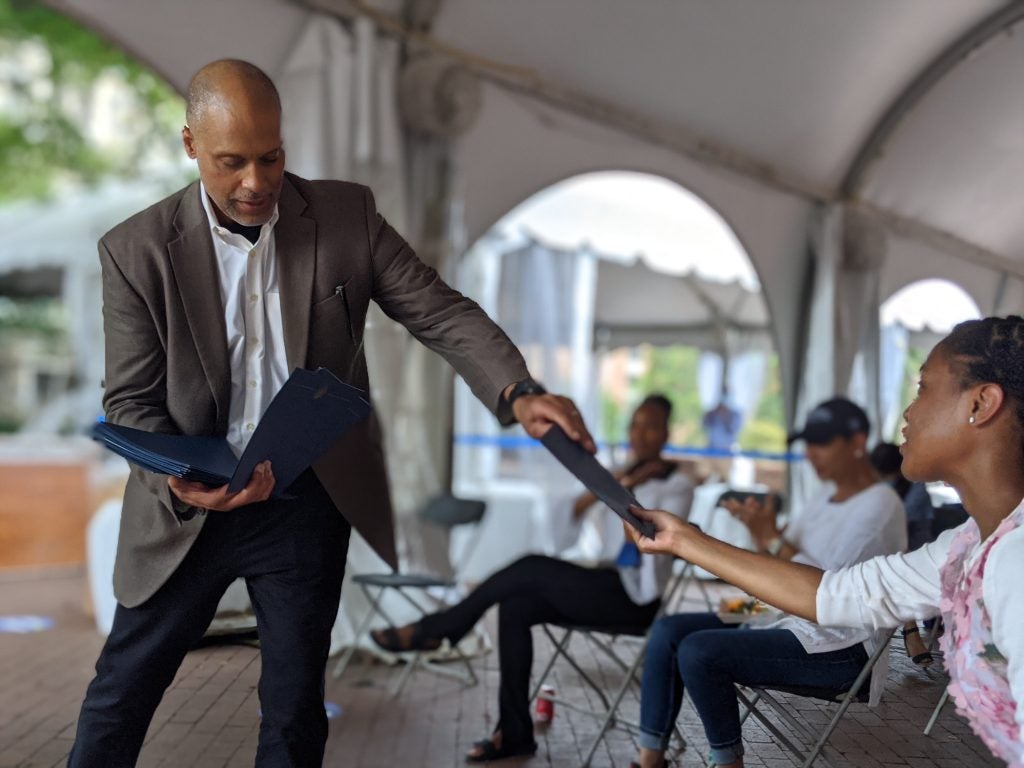
To further its founding mission of educating future global leaders, the Walsh School of Foreign Service has launched initiatives and programs that help lower barriers to an SFS education and add more diverse voices to the study of international affairs.
SFS Future Global Leaders Fellowship
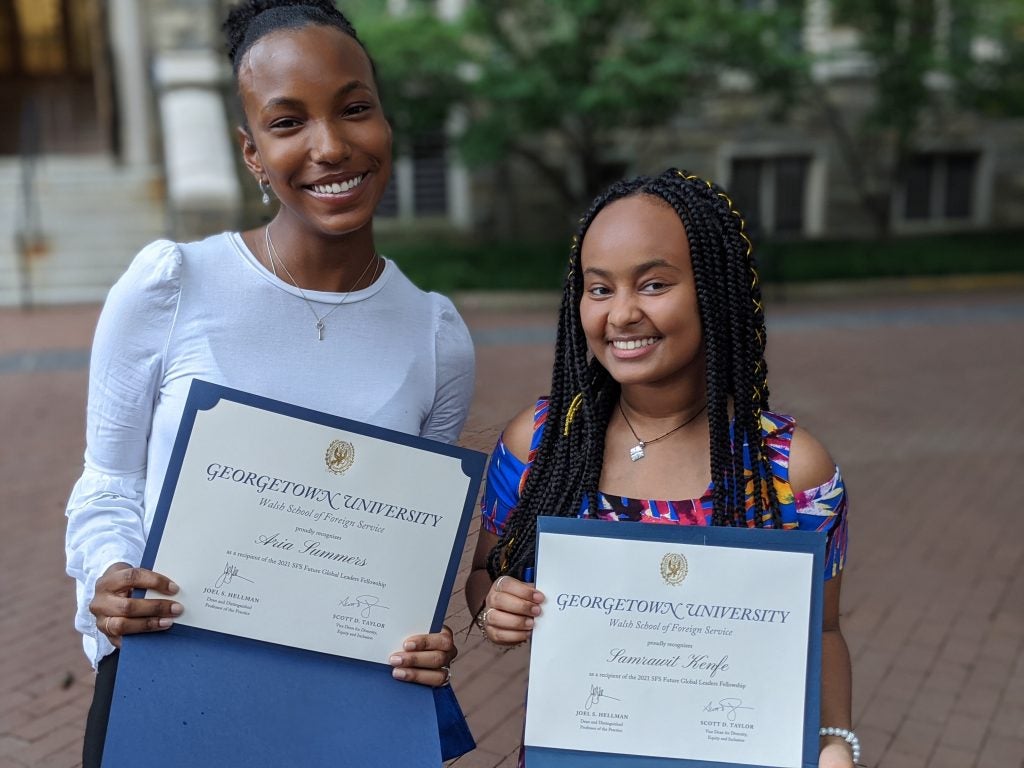
The SFS Future Global Leaders program is a week-long academic and leadership program that immerses and introduces high school students to the field of international affairs. This summer program is sponsored by the School of Foreign Service in collaboration with the School of Continuing Studies. It is designed to educate future global affairs professionals currently attending local high schools.
Administered by Georgetown’s School of Continuing Studies and taught by SFS Professor Anthony Clark Arend, the fellowship-eligible programs — Washington & the World Academy and International Relations Academy — help high school students explore key issues in modern international affairs and global service. In both programs, fellows will:
- Take part in classes, field trips, group discussions, and an international crisis simulation
- Hear from leading professors and practitioners of international relations
- Explore issues and careers in global affairs
- Live on campus and get an introduction to college life
- Receive a Certificate of Participation upon successful completion of the program
Rising high school sophomores, juniors, and seniors with a strong interest in global affairs are encouraged to apply. Accepted students are awarded full scholarships covering all program costs.
Program Eligibility:
Applicants must:
- Be rising sophomores, juniors, or seniors in the greater Washington, DC or Baltimore area
- Have a school official submit a completed Recommendation Form
- Submit a completed Student Application Form
Who is encouraged to apply?
- Students interested in international affairs or committed to making a difference in the world
- Students from underrepresented groups and backgrounds are encouraged to apply, including those who would be first generation college students, and those from low income families.
To apply, applicants need to:
- Gather contact information for themselves, a parent or guardian, and the person from your school who will provide a recommendation.
- Write a 300- to 500-word personal statement describing why they want to attend .
- Complete and submit the Student Application Form, including all required supporting documentation (i.e. essay and recommendation form)
- Speak with their recommender to ensure that person completes the Recommendation Form in a timely manner. The recommender should be someone who can verify your school records, and speak to your strengths and abilities.
- Applicants may be contacted for an interview.
Applications are considered complete upon submission of the application, photograph release form, and one recommendation from a teacher, counselor, or other school official.
Applications for Summer 2024 are now closed. Please revisit this site in January 2025 for an application for the summer of 2025.
Partnership with the National Education Equity Lab
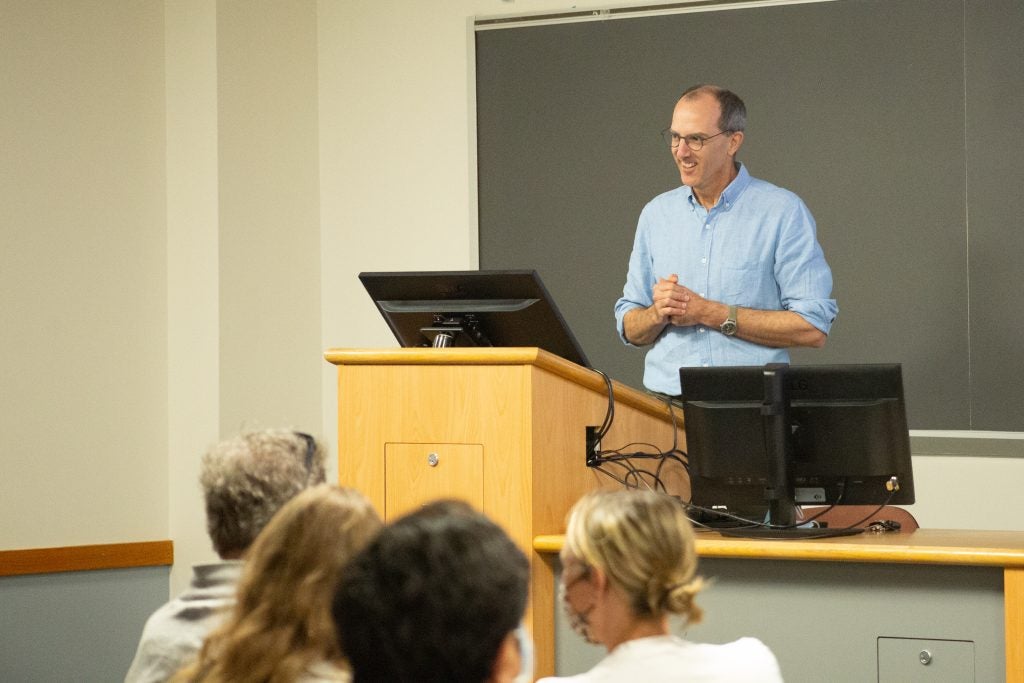
The School of Foreign Service is partnering up with the National Education Equity Lab to bring the Map of the Modern World class to high school students. Through this partnership, SFS will offer 150 to 200 U.S. high school students a no-cost place in Professor Mark Giordano’s Map of the Modern World class.
To be eligible for the program, students must attend a Title I high school, a designation granted to institutions where at least 35 percent of students qualify for free or reduced lunch and which determines eligibility for additional federal funding. Due to structural barriers like cost, underfunded high schools offer limited resources for low-income or first generation applicants meaning these students often have little contact with private, top-tier institutions such as Georgetown.
Students in the program will earn three college credits for the semester-long course, which will be integrated into their day-to-day high school experience. Giordano’s lectures will be available online for students to watch at home or in class, and students will meet virtually with their Georgetown teaching assistants in a weekly discussion section.
To ensure that participants across the country receive the support they need to succeed, teachers at the students’ high schools will be trained to facilitate the course. Students will also have the opportunity to engage with their TAs one-on-one through virtual office hours throughout the semester.
The academic experience students receive through Map of the Modern World will be supplemented by Georgetown and SFS information sessions; panel discussions with students, professors, deans and alumni; recruitment events and conversations with leading practitioners in international affairs.
With this course offering, Georgetown joins a number of top U.S. universities striving to expand academic access for more diverse communities of potential applicants by partnering with the National Education Equity Lab to deliver credit-bearing courses to high school classrooms.
“Even though passion and talent are evenly distributed in our country, opportunity is not,” according to the National Education Equity Lab. “By enabling high school students from historically underserved communities to take actual college courses from college professors, students can build the skills — and confidence — needed to apply to and thrive in college.”
SFS Ambassadors Program
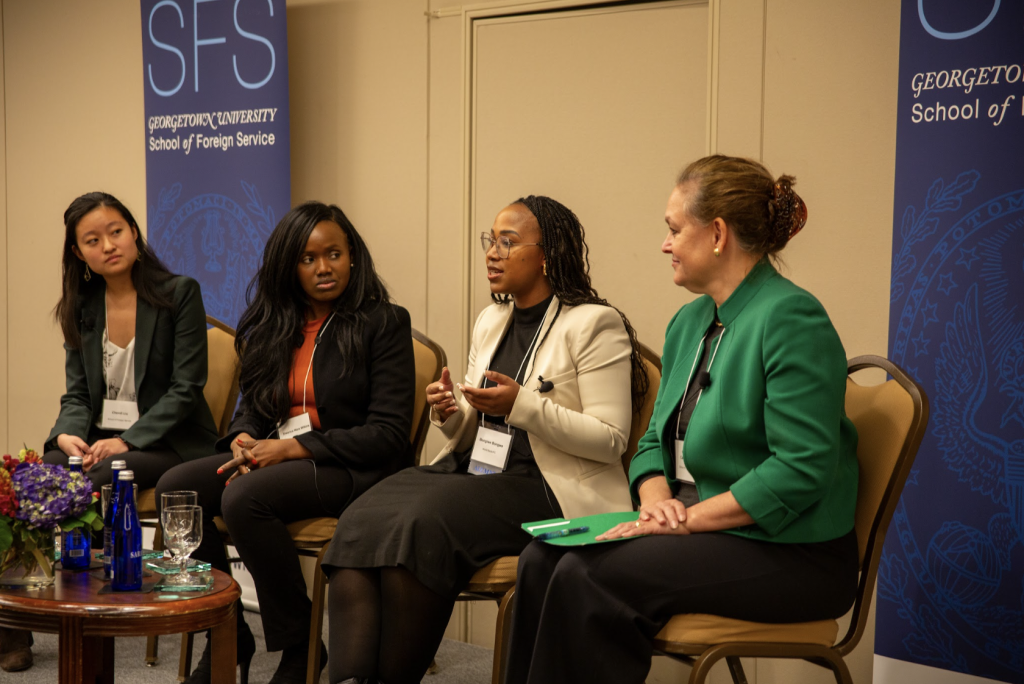
The SFS Office of Diversity, Equity and Inclusion understands the value of representation within and outside the SFS community. By including the voices of SFS students from underrepresented backgrounds and BIPOC groups, we not only strengthen DEI initiatives but also provide an opportunity for students to provide feedback as they engage with local high schools within the DC/Maryland/VA area.
SFS Student Ambassadors will represent the SFS in terms of its diversity, commitment to service, and sense of community. Our Student Ambassadors will be the voice of SFS at recruitment events, admissions events, orientation activities, and other extended outreach programming. Other responsibilities could include going to local high schools or undergraduate universities, hosting SFS BIPOC mixers for undergraduate and graduate students as sponsored by the Dean’s Office, and conducting special tours for SFS students of color. SFS Ambassadors will be recognized as outstanding members of the SFS community.
Applications open every Fall to invite new students to represent the SFS as Student Ambassadors.
Some responsibilities and requirements include the following:
- Students should be interested in making the SFS a more diverse and inclusive space.
- Students should be willing to commit 1-2 hours a week.
- Students will help lead presentations at local high schools in teams.
- Work with the Office of Diversity, Equity and Inclusion to do outreach for SFS DEI programming.
- Represent the SFS at student events, orientation activities, major SFS undergraduate and graduate student events.
- Answer any questions about the School of Foreign Service, provide students with your unique experiences as an SFS student, SFS resources, etc.
- Attend a mandatory training session in the Fall semester.
SFS Board Mentorship Program
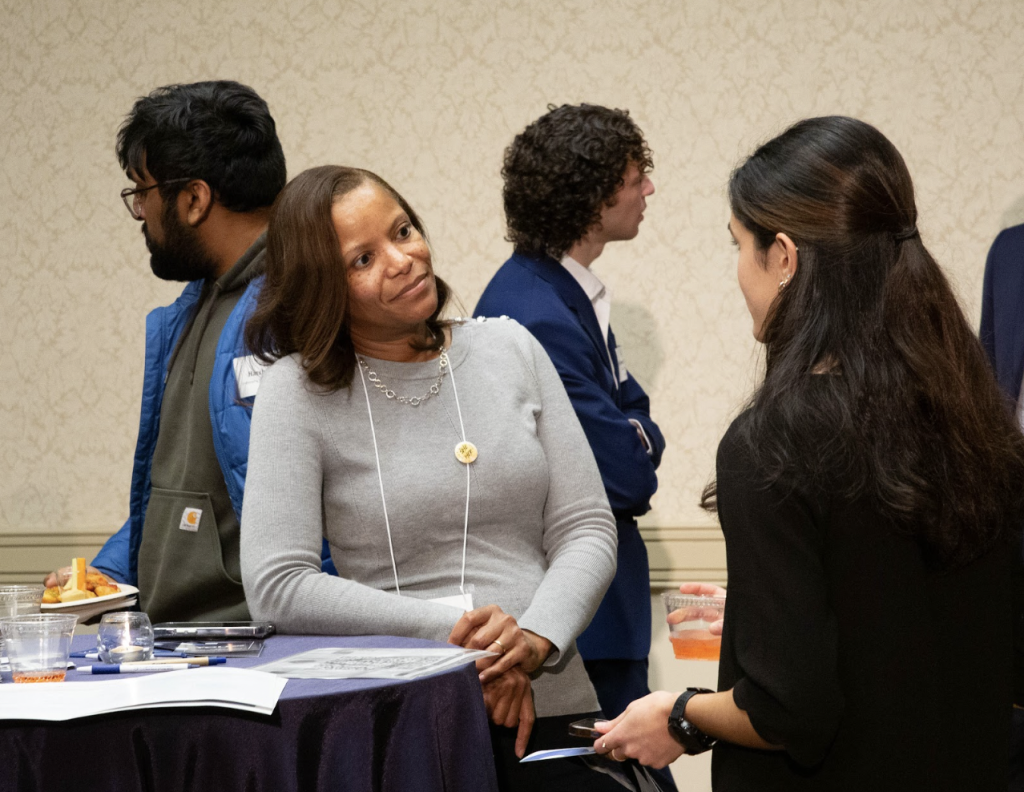
Program Description
The SFS Board Mentorship Program (BMP) was established by the Dean’s Diversity, Equity, and Inclusion (DEI) Office to ensure that underrepresented graduate and undergraduate students gain the mentoring and professional networking opportunities they need to succeed. Drawing on the expertise of our board members, this program seeks to ensure that students of all backgrounds achieve their fullest potential and impact. We hope to provide new networks of support and guidance for students’ careers, such as job and internship recommendations, advice on global industries, and other insights on global leadership. The goal is to make a tremendous difference in the lives of our diverse SFS students and to serve an essential role in shaping tomorrow’s leaders.
Mission:
The SFS Board Mentorship Program (BMP) supports returning graduate and junior or senior undergraduate students of diverse backgrounds in professional development, preparing the next generation of leaders in Foreign Affairs.
Goal:
The goal of the SFS Board Mentorship Program (BMP) is to place students in rewarding relationships with distinguished leaders, helping them to become confident graduates with exceptional professional skills.
Areas of Focus
Five key areas of focus have been identified for matching mentees with mentors. Please note that mentoring is not limited to these areas:
- Career Interests and Advice
- Professional Opportunities
- Balancing Career and Family
- Post-graduate Educational Opportunities
- Industry Information
Mentor
SFS Board Mentorship Program (BMP) Mentors are members of the SFS Board of Advisors who intentionally invest their time to facilitate the student’s successful preparation for, and progression into, a post-graduate career by consulting them on topics relevant to their unique developmental opportunities.
Mentoring Expectations
Under the guidance of the Dean’s Office of Diversity, Equity, and Inclusion, Mentors will participate in planned events and monthly engagement with mentees. Each Mentor will set personal goals for the success of the mentoring relationship. The Mentor will guide Mentees using their experiences to offer perspective and inform mentees about various opportunities for development and guidance on careers. The Mentee will take responsibility for his/her growth and success. Both the Mentor and the Mentee must maintain the confidentiality of the relationship. The formal mentoring relationship will conclude after one year. After one year, Mentees and Mentors can opt to continue their relationship on an informal basis, if desired.
Mentor Responsibilities:
- Meet with your Mentee in person, via Zoom, on the telephone, and through text communication
- Willingly share your experience, “lessons learned” and professional success
- Stay accessible, committed, and engaged throughout the program
- Seek experiences that will challenge the mentee (i.e., shadowing during meetings, readings, etc.)
- Provide mentees with internship suggestions or referrals to help them progress in their careers.
- Listen, offer encouragement, and provide candid feedback through genuine positive reinforcement
- Be a positive role model, resource, and sounding board
Benefits of Program to Board Mentor:
- Gain inspiration and a sense of reward from the service of the mentorship experience and connection with students.
- Help diversify the global affairs profession.
- Develop an emerging leader.
- Give back to the SFS community!
Mentee
The SFS Board Mentorship Program (BMP) is targeted at returning graduate students, and junior or senior undergraduate students. It supports students from underrepresented populations (including racial, ethnic, and religious minorities, LGBTQ+ students, first-generation students, international students, veterans, and students with disabilities) by connecting them with a seasoned professional. Once accepted into the program, a student is paired with an SFS Board Member. Mentees are matched with mentors based on several criteria and preferences (such as identity, academic interests, hobbies, and extracurricular activities).
Mentee Roles and Responsibilities
A mentee who wants to get the most out of the mentoring relationship will actively “manage up.” This means that the mentee takes ownership of and helps direct the relationship by being proactive.
Initiating and cultivating the mentoring relationship:
- Schedule meetings.
- Prepare the meeting agendas and questions in advance and run meetings.
- Communicate in the way the mentor prefers (phone, email, text, and/or in person).
- Agree on the structure and objectives of the relationship .
- Ask questions and actively listen.
- Be responsive and flexible.
- Ask for feedback and participate in the mentoring evaluation.
- Be gracious and appreciative.
Assisting your mentor in giving relevant advice and counsel:
- Set goals and expectations that are achievable, realistic, and time-specific.
- Identify knowledge and skill gaps (Mentee Self-Assessment Form).
- List specific opportunities and guidance sought. (Individualized Development Plan)
Following through on assigned tasks and opportunities provided by the mentor:
- Participate in networking and collaboration opportunities.
- Complete and report back on assigned tasks
SFS Peer Mentorship Program
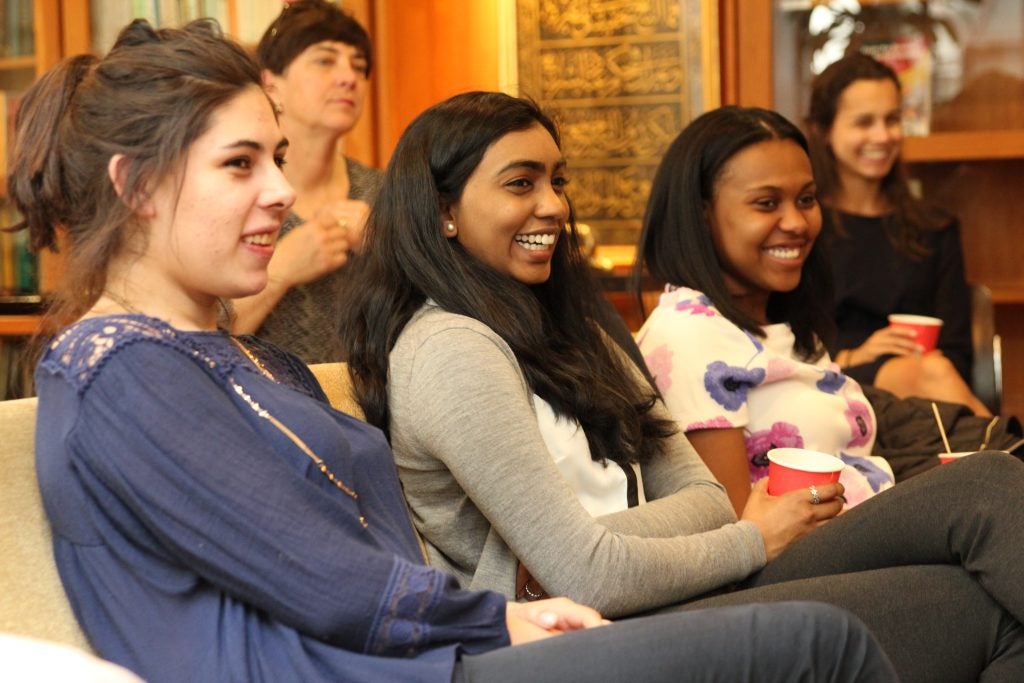
Brief Program Description
The SFS Peer Mentorship Program was established by the Diversity, Equity & Inclusion (DEI) Office to ensure that students of diverse backgrounds receive the mentoring and peer-to-peer advising needed to succeed as they transition to college. It is intended to help a large campus community seem smaller as connections are made. We hope mentors encourage and enable new students to take advantage of all Georgetown offers.
Drawing on the expertise of our SFS Mentors from different grade levels, diverse backgrounds, and varied majors, this program seeks to foster a climate across SFS that ensures first-year students from a wide range of experiences are equipped to succeed. Through the program, we hope to provide students with new support networks and advice to navigate SFS, dorm life, CAPS, academe, career planning, and much more.
Mission:
The SFS Peer Mentorship Program (PMP) supports first-year undergraduate students from diverse backgrounds in transitioning to Georgetown University.
Goal:
To increase retention by alleviating initial isolation, increasing student involvement and interaction, providing students with encouragement and inspiration, and bridging the gap to institutional services and support systems. A series of programs and activities are designed to assist students with their adjustment to college life.
Intended Outcomes:
- Relationships among experienced students and first-year students
- Students acclimated to college life at Georgetown through involvement, access to campus resources, and academic success
- (i.e., CAPS, Career Center, CMEA, ARC, Academic Advising, etc.)
Mentors
PMP mentors are undergraduate juniors and seniors from various majors. Mentors must be in good academic and institutional standing, with a minimum 3.25 GPA. Mentors are selected and trained to support first-year students facing various challenges. Serving as a mentor allows students to build their skill set as exceptional student leaders and to work closely with SFS staff.
Mentor Expectations
Under the guidance of the Office of Diversity, Equity, and Inclusion, Mentors will participate in planned PMP events, monthly mentor meetings, and monthly engagement with mentees. Each Mentor will set personal goals for the success of the mentoring relationship. The Mentor will guide Mentees, as requested, using their experiences to offer perspective and inform mentees about various resources available to help. The Mentee will take responsibility for their growth and success. Both the Mentor and the Mentee must maintain the confidentiality of the relationship. The formal mentoring relationship will conclude after one academic year in the program. Beyond the first year, peer mentees and peer mentors can opt to continue their relationship on an informal basis if desired.
Mentor Requirements:
- Attend orientation/training
- Be an undergraduate Junior and Senior in SFS
- Maintain a 3.25 GPA
- Be willing to dedicate 5 hours per month for the academic year to mentorship
Mentor Responsibilities:
- Meet with your Mentee in person, via Zoom, and through text communication
- Complete a monthly Activity Log
- Stay accessible, committed, and engaged for the length of the program
- Work with your mentee to create personal, professional, and academic goals for the Mentee’s first year in college
- Provide support and encouragement where needed and help point Mentees to campus resources and involvement opportunities
Benefits of Program to Peer Mentor:
- Mentors gain mentorship skills and added value for future career roles
- Mentors are trained on how to handle different situations
- Mentors receive a stipend at the end of the semester
Mentee
The SFS Peer Mentorship Program is open to incoming first-semester undergraduates. It supports students from underrepresented populations (racial, ethnic, and religious minorities, LGBTQ+ students, first-generation students, international students, veterans, students with disabilities, etc.) to assist in effectively connecting them to the Georgetown community. Once accepted into the program, first-year students are paired with a junior or senior as a peer mentor. Mentees are matched with peer mentors based on several criteria and preferences (identity, academic interests, hobbies, and extracurricular activities).
Mentee Expectations
- Connect with your mentor monthly
- Communicate needs for support to Mentor & SFS Staff
- Attend monthly events
- Express commitment to the program
- Complete end-of-semester evaluation
Mentee Requirements:
- 2 PMP Events per semester (can include community workshops, programs, and events)
- 3 Interactions with your Mentor per month (minimum!)
- At least 1 in-person engagement must be a non-text interaction
Benefits of Program to Mentee:
- The feeling of belonging & community
- Academic, personal & social resources and activities
- Enhanced awareness of campus and community resources and services
- Higher level of confidence and self-efficacy
When a student has been accepted into the program, they will be notified via email and invited to attend the PMP kick-off event. During the PMP Kick-off event, Mentees meet their Mentors and receive an overview of the program, including the expectations for participating in the PMP Program. Mentees will also confirm their commitment to the program by completing a Mentee Contract.